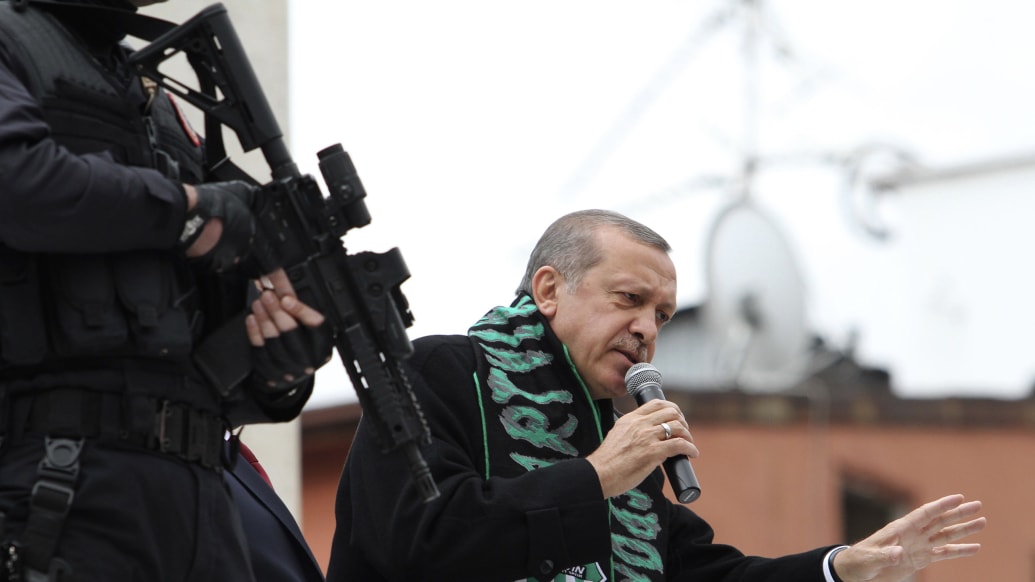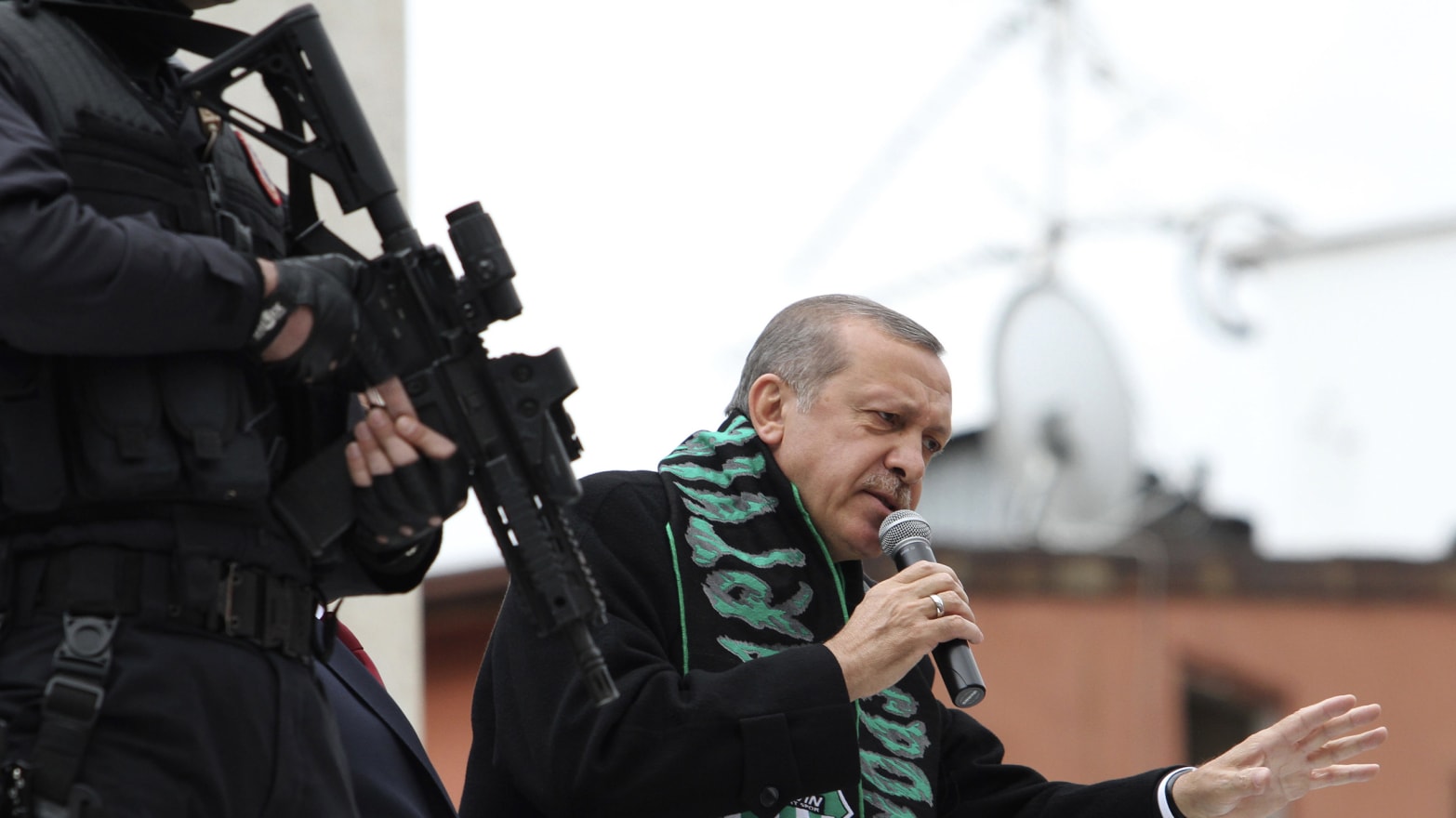Turkey’s embattled Prime Minister Recep Tayyip Erdogan has banned the use of Twitter in his country. It's a panicky move coming amid a deluge of corruption allegations a week before key elections. And it's already backfired. In a reaction described as the biggest wave of civil disobedience in recent Turkish history, millions of Turks, including the President, defied the embargo.

It was the biggest effort to restrict Internet access in Turkey since a two-year ban of YouTube from 2008 to 2010 because of a clip that Ankara said contained insults of the country’s founder Mustafa Kemal Ataturk.
The ban, which came into force around midnight on Friday local time (6pm EST on Thursday), triggered an outcry both within Turkey and abroad and even a rare public rebuke for Erdogan by President Abdullah Gul, a long-standing ally of the prime minister. Gul ignored the ban and used his Twitter account to express his hope that “this practice will not last long.”
The CNN-Turk news channel reported Turkey had joined a group of countries that included China and Iran. Neelie Kroes, the EU commissioner for digital agenda, called the ban “groundless, pointless, cowardly,” as well as an act of censorship.
Erdogan had announced the move in a speech on Thursday, vowing to “eradicate Twitter.” The prime minister has been under pressure for weeks as unknown Twitter users used the platform to publish links to the recording of alleged telephone conversations with Erdogan, in which he was heard discussing how to hide money from the judiciary, meddling in court cases and telling newspaper editors to fire journalists.
By Friday morning, it was obvious that the prime minister’s desperate attempt to stop Turks from using Twitter had failed. Many Turks found ways around the rule by using proxy servers, texting Tweets or changing the domain name settings , with the online edition of the Hurriyet newspaper reporting that 500,000 tweets from within Turkey had been recorded during the first 10 hours of the ban, close to 30 per cent of the total number of tweets on a normal day.
Mainstream media like Hurriyet published tips of how to circumvent the restriction. Twitter itself also offered advice. “Turkish users: you can send Tweets using SMS,” said a Tweet by the company’s policy team in both English and Turkish. Twitter has about ten million users in Turkey.
As the day wore on, the ban seemed to be boosting the role of Twitter as a platform for government critics and opposition parties, while Erdogan himself and government institutions were unable to get their message across because they were obeying the ban.
Turkish Twitter accounts were abuzz with angry comments and jokes from Erdogan critics, but Tweets by officials and pro-government users were hard to find. “Where are all the AKP people?” Fazil Say, a prominent pianist and Erdogan critics asked on his account, in reference to Erdogan’s ruling Justice and Development Party (AKP). “They have vanished.”
Ziya Meral, a Turkish analyst based in London, said on Twitter that Turkish users were finding ways around the ban en masse, in what he called “the largest case of civil disobedience in recent history in Turkey”.
By mid-morning, even some government officials had had enough and, like Gul, broke the ban. Deputy Prime Minister and government spokesman Bulent Arinc tweeted to inform his followers about a campaign rally he was planning to attend.
Erdogan, 60, rose from a childhood in a poor Istanbul neighborhood to the pinnacle of power in Ankara. In his 11 years as prime minister since 2003, Turkey, an important US ally and member of NATO, has been transformed by an unprecedented economic boom. As the leader of a country that sits at a crucial geostrategic juncture between East and West, Erdogan has led Turkey into negotiations to join the European Union and has been careful to keep close ties with Washington.
In recent years, however, the prime minister has become more authoritarian, and some opposition leaders today call him a “dictator”. Last year, Erdogan came down hard on demonstrators protesting against a construction project in Istanbul’s Gezi Park, with brutal police action sparking countrywide riots.
In December, Istanbul prosecutors arrested dozens of people in what they called a corruption scheme that involved ministers from the Erdogan cabinet. In response, Erdogan had thousands of police officers, judges and prosecutors reassigned, arguing the corruption allegations were part of a conspiracy by followers of the US-based Islamic scholar Fethullah Gulen, something Gulen denies.
As the corruption scandal broke, the recordings of wiretapped telephone conversations began appearing on the Internet. Erdogan dismissed some of the recordings as fake or manipulated, but admitted the authenticity of others. In recent days, the Turkish media was awash with speculation that further recordings and maybe even video footage of officials engaging in corruption or extramarital affairs might be published before local elections on March 30.
The elections are an important test for Erdogan’s popularity and will help to decide whether the prime minister will run for president in elections in August. Some polls suggest Erdogan’s AKP may suffer a setback on March 30, although most predict the party will remain Turkey’s strongest political force with around 40 per cent of the vote. The AKP won almost 50 per cent in general elections in 2011.
Given the significance of the upcoming elections, Erdogan apparently decided it was time to act to stop the publication of the embarrassing recordings. “We will eradicate Twitter”, he said during a campaign speech on Thursday. “I am not interested in what the international community says. They will see the power of the Turkish republic.”
Shortly afterwards, Turkey’s Internet watchdog blocked access to Twitter as a “protection measure”. The state Organization for Information Technology and Communication (BTK) said in a statement the move had been triggered by “citizens’ complaints” about violation of privacy by Twitter. It added Turkish courts had ruled that some Tweets should be removed but that the company had not done so.
“There was no other option left” but to ban the whole of Twitter, the BTK claimed. It said the ban would be lifted as soon as the Tweets in question were removed.
The ban came only weeks after Erdogan first threatened to close down YouTube and Facebook because of the ongoing corruption allegations. Erdogan later said he did not mean a blanket ban.

